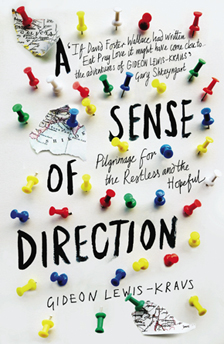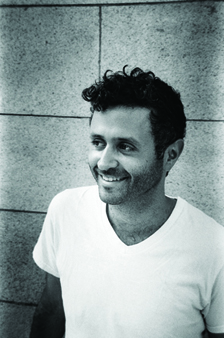Sow the weeds
by Gideon Lewis-KrausThese are my best tips for writing non-fiction. I haven’t the faintest idea how one approaches novels or stories, and the below is probably terrible advice for fiction writers, who just seem to need a lot of time.
1. Writing is a job
The worst thing you can do for your writing is get precious about the circumstances of composition. If you can only write when you’ve gotten exactly eight hours of sleep and have had precisely sixteen ounces of coffee and the light is just-so slanting across your desk, you’re dooming yourself to these constraints in perpetuity. If you want to write as a job, you have to treat it like a job, which means that you write when you’re sick and you write when you’re out of sorts and you write when it’s noisy and you write when you don’t feel like it. In an early review of my book, a cranky older gentleman gave me a hard time for talking about carrying around my phone and a folding keyboard. He acted as though the phone was a distraction. But I had the phone to write on it, often while hunched over at a bus stop or in a crowded hotel lobby.
2. Iterate quickly and generate feedback
The startup world loves to talk about a book called The Lean Startup by Eris Reis; everyone in Silicon Valley has read at least twenty pages of it, which is twenty more pages than they’ve read of most books. The idea behind the book is that companies fail because they sink great costs into preparation and planning, and that if you want to make something that finds a home in the world you have to test it. They call this the ‘minimum viable product’. There are people who will say, “Well, this works fine for a product with a market, but the audience for writing isn’t a market.” If you are lucky enough to come from wealth, it’s true, an audience isn’t a market. But even if you do write for money, I’m not recommending you focus-group your work; my suggestion is that, if this is something you want to resonate with readers, you ought to be asking select readers what they make of it as you go along. In any case, this doesn’t obtain for everything I write, but often I’ll rush through three or four quick drafts of something and then, once I have a version I feel reasonably confident about, I show it to my close writer friends. I have one friend whose only commentary is one asterisk anywhere he would’ve put down the newspaper, magazine or journal and moved on to something else. He doesn’t say what’s wrong; he just says, There’s something wrong here. Then I fix all of those things and send it to a different group of friends. These friends don’t even have to be writers. They just have to be honest with you. Which brings me to my next point:
3. Trust reactions but don’t trust advice
This piece of advice is baldly stolen from Neil Gaiman, who says somewhere that you should always trust people when they tell you when something’s wrong but never trust them when they tell you how to make it right. There are, obviously, some exceptions; I have a few editors who are great at saying, “You need a second paragraph about X here,” or “Expand on Y there.” But for the most part this seems to me like good advice. Another way of saying this – and I think Adam Gopnik says this somewhere or other – is that you should always keep in mind that your readers are emotionally smarter and intellectually stupider than you think they are. They will generally miss your carefully deployed allusion to Proust, but they will never miss insincerity or cheapness.
4. Open with the most important thing
A lot of writers, if they’re working on an essay that makes an Argument, feel they need to build to a Point. This Point is like a little jewel they have stashed away in a velvet box. The jewel is only freed from its velvet repose at the very end of the Argument, where it’s expected to dazzle. The trouble is, this style of writing usually results in 99 lines of throat-clearing and other superfluities for every line of actual insight. If you really want to write something that’s going to be worthwhile, it’s got to be something that surprises the reader, and the first way to know if you might surprise a reader is to surprise yourself. So: start with the jewel. Make it your first sentence. Now you’re properly uneasy. You’ve already revealed the secret you’ve been hoarding. Now the work of writing is to move forward from one insight rather than move backward toward a boring introduction. You will likely discover you’ve said something much more interesting by the end than you ever thought you would.
The best way to outwit the blank page is not to start with one. Instead, start with a page that’s full of everything you’ve been writing.”
5. Write as you go along
The hardest part of writing, needless to say, is the blank page. Most writerly tricks consist in how to outwit the fact of the blank page. The best way, I’ve found, to outwit the fact of the blank page is not to start with one. Instead of starting with a blank page, start with a full page – a page that’s full of everything you’ve been writing as you go along. When I’m reporting a story, or working on an essay about a book, I usually spend the last hour or two of my day writing out, in narrative form, the scenes or the ideas that seemed most promising. It’s the end of the day and you’ve done a lot of work, so you can allow yourself to write badly in good faith, which is to say you don’t have to worry about seeming coruscating or anything, you can just shovel it out onto the page, mix the hell out of your metaphors, do whatever you feel like. Then, by the time you’ve finished your reporting or your preparatory reading, instead of an open field, you’ve got a field full of wildflowers and weeds and saplings. The first draft becomes not about planting but about much more easily accomplished errands, like weeding and shaping. In the end, if you’ve really done the work, the garden will look utterly unlike the messy field you first encountered, but you’ll have tricked yourself into thinking that the major work was already done.
6. Let things lie fallow
To continue the mixed metaphor above, build time into your schedule to let work lie fallow. Don’t set yourself up with so little time that one draft must immediately follow upon the last. Start early enough so that you can write a draft, let it sit for a few days, go for a walk, go to yoga, clean the house, watch a movie – do anything as long as it’s unrelated to the thing you’re working on. You’ll be surprised to discover how much work your mind is unshowily accomplishing in the interim; you’ll come back to work and discover all sorts of new solutions to what might have seemed like insurmountable problems. Plus, you won’t be sentimental about your own sentences, and a lot of writing is cultivating just the right detachment.
7. Read while you’re writing
Norman Mailer used to say that while he was writing he would only ever read the New York Times, because he didn’t want his style to be affected by something he was reading. This strikes me as silly and counterproductive. Read for inspiration and influence, but don’t do it indiscriminately. Read something that’s both good and somehow germane. This seems kind of an obvious point but it seems worth stating in face of pervasive calls for writerly purity.
8. All parts of the process ought to be worth it
If you write for publication, you’re probably going to be disappointed; publication is almost invariably anticlimactic. The most satisfying things for me to write are those that have been meaningful and diverting every step of the way; if it’s a reported piece, that means reporting on people who are interesting or stories that seem absorbing; if it’s an essay, that means writing about books you’re interested in reading anyway. Then the writing should feel, at least from time to time, like play, and the editing ought to feel like necessary finish work. If you end-load your expectations onto seeing your name in some special font, you’re probably not going to feel as though the whole thing was worthwhile.
Gideon Lewis-Kraus has written for US publications including Harper’s, The Believer, The New York Times Book Review, Los Angeles Times Book Review, Slate and others. A 2007–8 Fulbright scholarship took him to Berlin, a hotbed of contemporary restlessness where he conceived A Sense of Direction, his first book. He lives in New York, but is frequently on the road to other places. A Sense of Direction featured as a BBC Radio 4 Book of the Week in March 2014. Read more.
gideonlk.com
A Sense of Direction is part travelogue, part memoir, and part digressive exercise in the anthropology of contemporary pilgrimage. It is published in the UK by ONE, an imprint of Pushkin Press.
“There is just the right measure here of the knowing, the self-deluding and the knowingly self-deluding for us not to write this book off as simply a male take on the path-to-enlightenment banalities of, say, Elizabeth Gilbert’s Eat, Pray, Love. Outer journey as metaphor for inner journey teeters perilously close to cliché. Fortunately Lewis-Kraus is too good a writer to fall into the more obvious traps: his ear for dialogue is sharp and funny, his observations of others are astute without being cruel, his anxieties genuinely endearing.”
Rebecca Abrams, Financial Times



